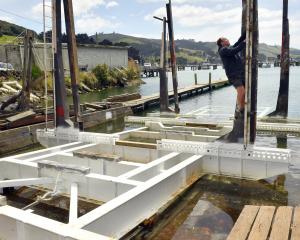
No-one is signalling panic stations yet but one power generator has already asked the Tiwai Point aluminium smelter to reduce its electricity use for a period, and the latest statistics show coal use to produce electricity ramped up by 99% for the March quarter from the same period last year.
The National Institute of Water and Atmospheric Research (Niwa) is suggesting there might be some cause for concern if there is no change in weather systems next month.

"Other lakes which we do not control, such as Lake Wanaka, are less than half their normal levels for this time of year.
"While lake levels are low due to a dry weather spell since May, water levels have not affected our ability to meet peak demand at our Clyde and Roxburgh Dams.
"Our Taranaki Combined Cycle [TCC] and Whirinaki thermal power stations are also available to be used to meet demand, as required."
Meridian Energy general manager for wholesale Chris Ewers said Lake Pukaki, the company’s main storage lake, was 76% of average.
The Waiau catchment, which feeds the Manapouri station, was at 78% of average and "we’re managing this prudently as well".
"We’re taking all prudent steps to manage this, including asking the Tiwai Point smelter to dial back production to reduce demand last week. The levels are still a long way from historical lows.
"We’re taking a cautious approach, but a long way from panic stations."
Genesis Energy was not concerned about the level of Lake Tekapo, a spokeswoman said.
"It’s about 40% full and 3.2m above the minimum consented limit, which is not unusual for this time of year ... It usually drops due to inflows being locked up as snow in the mountains, which come down in spring."

"The inflows have been well below normal.
"While there is active weather around the country over the next seven to 10 days, a lot of that rainfall is going to miss the hydro lakes.
"There’s going to be no significant change — if not a slight worsening — over the next two weeks."
Next month’s weather patterns were likely to be "crucial", he said.
"It’s going to be an important month ... If that rain moisture doesn’t return, we are expecting a La Nina to develop later in the year. That last La Nina led to some pretty dry conditions around the hydro lakes.
"Snow and snow melt is very important for hydro lakes in the spring, and the winter season is unlikely to be colder than average, so the opportunities for snow could be few and far between."
The MBIE said in a statement yesterday that following a drier summer and below normal rainfall, generation from gas and coal was needed to meet demand for electricity.
Compared with the March quarter last year there was a 99% increase in the use of coal for electricity generation.
That led to a lower share of renewable electricity generation, greenhouse gas emissions from electricity generation increasing by 21.5% compared with the March 2023 quarter.












